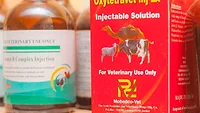FAO Highlights Global Efforts, Resources for Fighting Foodborne AMR

Credit: EmilianDanaila (emiliandanaila-3606652) via Pixabay
Antimicrobial resistance (AMR) is a pressing food safety issue that poses a threat to global health. At the Global Conference on Foodborne AMR, which took place September 27–28, 2022 in Seoul, Korea, the Food and Agriculture Organization of the United Nations (FAO) highlighted the need for a “One Health” approach to addressing AMR in food, and introduced a new project to support certain nations in adopting Codex Alimentarius standards on foodborne AMR.
At the conference, FAO food safety officers also presented tools provided by the organization that countries can use to monitor the implementation of AMR Codex standards, such as the International FAO AMR Monitoring System and IT platform (InFARM). The new InFARM was created as part of an effort to encourage nations to regularly generate and analyze reliable and comparable data on AMR in food and agriculture, and data on antimicrobial use in crops and plants.
AMR Codex Texts Project
During the Global Conference on Foodborne AMR, the AMR Codex Texts (ACT) project was introduced and its progress outlined. The project, supported by the Korean government, aims to help six countries—Bolivia, Cambodia, Colombia, Mongolia, Nepal, and Pakistan—implement Codex standards on foodborne AMR both globally and locally. The project will also assess the use and impact of Codex standards related to AMR. Results of the ACT project will be used to plan effective interventions to promote the adoption of Codex standards in other regions.
The ACT project features a two-part approach to support participating countries by: 1) developing tools and approaches for the use of Codex standards, with a specific focus on data collection and analysis to inform risk management of foodborne AMR; and 2) assessing the needs of and supporting countries in the implementation of monitoring and surveillance programs, as well as risk management measures.
Goals of the ACT project include raising awareness and increasing the use of Codex standards on AMR, developing and implementing an integrated monitoring and surveillance system of AMR and antimicrobial use in food production, and strengthening national capacities to manage the development and transmission of foodborne AMR through the adoption and implementation of Codex standards.
The ACT project began in July 2021 and will conclude in July 2026.
Codex Standards on Foodborne AMR
Looking for quick answers on food safety topics?
Try Ask FSM, our new smart AI search tool.
Ask FSM →
In 2022, FAO and the World Health Organization (WHO) released Foodborne Antimicrobial Resistance: Compendium of Standards, which updates and collates three key Codex texts that support governments in tackling foodborne AMR: the Code of Practice to Minimize and Contain Antimicrobial Resistance (2005), Guidelines for Risk Analysis of Foodborne Antimicrobial Resistance (2011), and Guidelines on Integrated Monitoring and Surveillance of Foodborne Antimicrobial Resistance (2022).
The Code of Practice was developed to minimize the potential adverse impact on public health resulting from the use of antimicrobials in food-producing animals. The updated version presented in the Compendium of Standards addresses the risks of foodborne AMR from production through consumption, taking into account modern knowledge on food safety along the food chain and AMR risk management. The Code of Practice describes the responsibilities that different stakeholders have in contributing to the reduction of antimicrobials along the food chain.
The Guidelines for Risk Analysis provide a structured risk analysis framework to address the hazards to human health posed by the presence of antimicrobial-resistant microorganisms in food and animal feed. Guidelines on Integrated Monitoring and Surveillance provides governments assistance in the design and implementation of integrated monitoring and surveillance programs on AMR, including flexible options based on individual nations’ resources, infrastructure, capacity, and priorities.
In total, the Compendium of Standards provides science-based guidance on processes and methodology that governments can use for foodborne AMR risk analysis. The standards also aim to assess the risk to human health associated with AMR in food and animal feed, and the transmission of AMR through food and animal feed, to provide advice on risk management activities. Additionally, the standards address the risks associated with different antimicrobial uses such as in veterinary applications, for plant protection, or in food processing.









